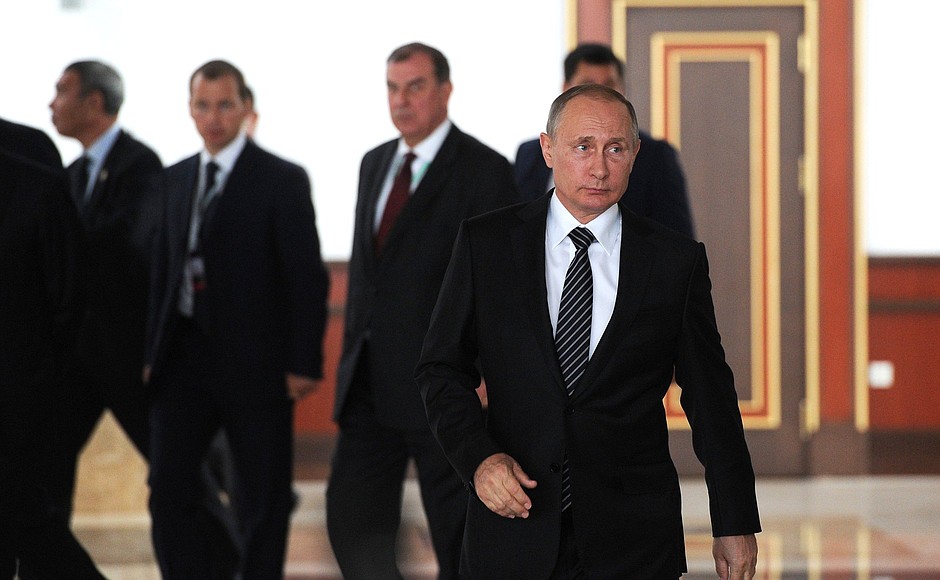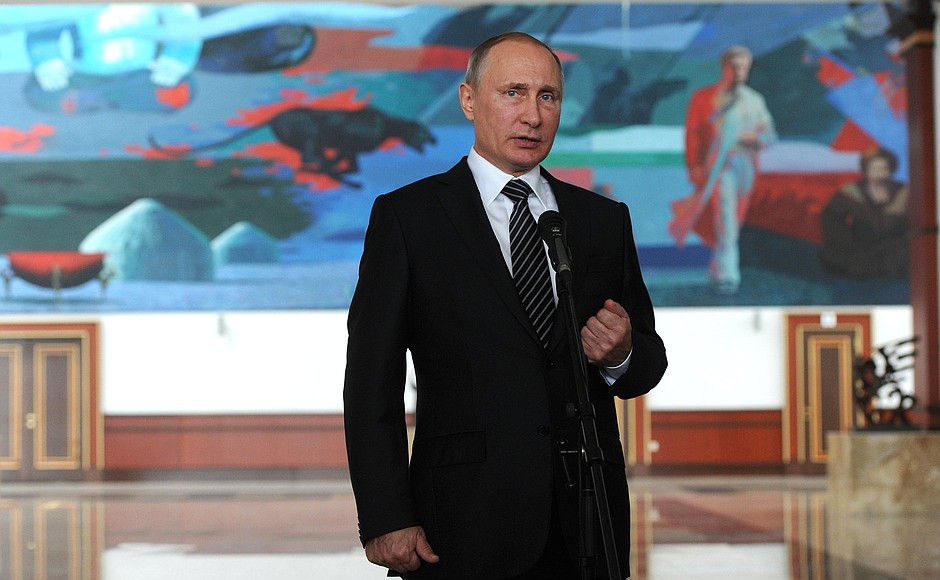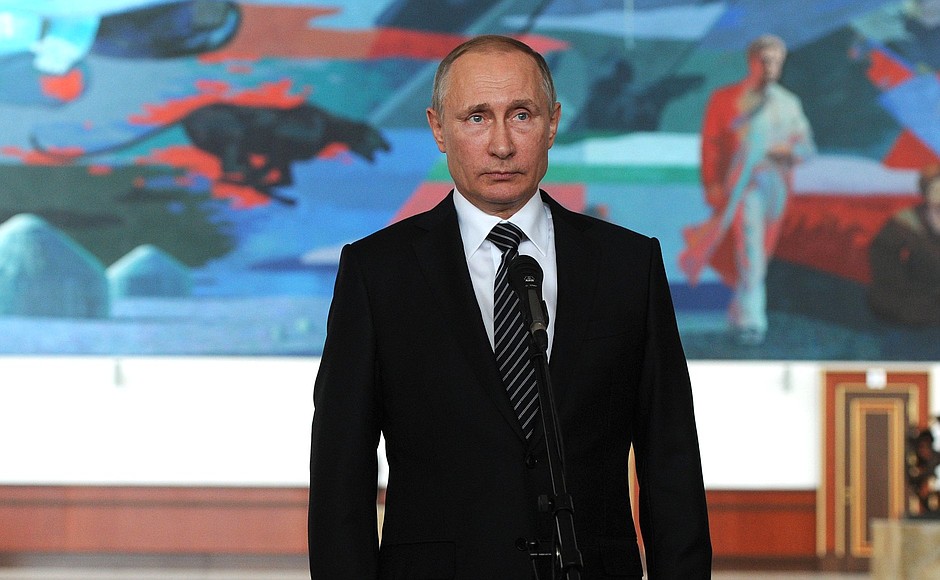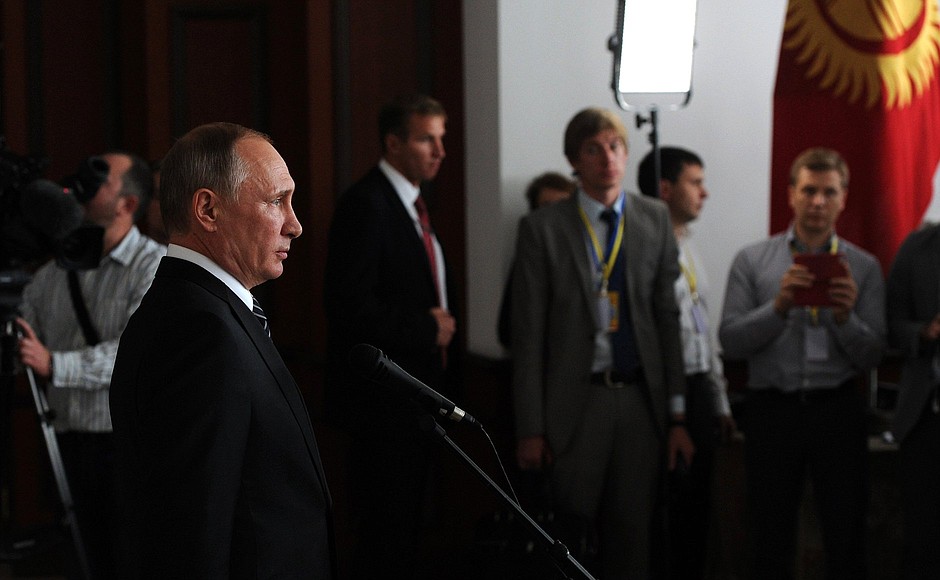President of Russia Vladimir Putin: Good afternoon. What are we going to talk about? What would you like to know?
Question: Mr President, what are results of the summit? In your opinion, after 25 years is the organisation still necessary? Perhaps there is no more need for the Commonwealth? What issues were on the agenda apart from summarising the results? Could you tell us which problems will be tackled in the first place? Are there many disagreements within the CIS?
Vladimir Putin: As a rule, disappointment happens because of excessive expectations. Perhaps it is true and when the organisation was being established, the expectations were too high. Actually, it played a very important role, which was probably its historic purpose. The CIS created conditions for its members to make a smooth, gradual and comfortable transition to becoming sovereign states. It created the conditions in which we continued to cooperate with each other and, at the same time, strengthen our own sovereignty.
Each of the Commonwealth states made its own conclusions about the organisation’s work and, therefore, we approached the 25th anniversary with an almost unanimous opinion that can be considered the main outcome. The shared opinion is that the CIS must continue as a full-fledged international organisation. This is the first point.
Second. Everybody believes – and this is my opinion too – that parallel structures are redundant. Anything that hinders progress, anything that creates and maintains international bureaucracy must be transformed into other frameworks that will be seeking solutions to the specific issues our states are facing.
We know that the post-Soviet countries were left with a huge positive legacy. There are problems, too, and we are aware of them, but there is a colossal positive legacy, including a common infrastructure, a common energy and transport infrastructure, that is both railways and a road network. It is also the Russian language that unites us all.
In the European Union, everybody must speak their own language and they have to use 27 interpreters, while we hardly need any. It is a huge unifying force that we are not even aware of and do not even notice in our everyday life and everyday communication. However, it is a significant aspect of our existence and an important positive factor of our collective development.
I believe this is the most important point. We have outlined paths and directions for the organisation’s further development and will follow them as we move forward. As you may know, Moldova is in line for the next presidency but there are difficulties we all know about and we hope that Moldova overcomes them as soon as possible.
Yesterday and today, I had very productive meetings with the Prime Minister of Moldova. I hope we can build a positive working dialogue and we will see how it goes. We would really like to find consensus, but bilaterally it is not possible any more considering that Moldova has signed an agreement with the European Union. Now we obviously need to involve the European Commission. I hope we can work out some successful solutions.
This is what I have say about yesterday’s meeting. As I said yesterday, Russia is hosting the next summit. At the request of our colleagues, it will take place in Moscow in October 2017.
Question: Mr President, the election campaign is gaining momentum in the United States and you are playing a certain role in it – at least, your name features in both candidates’ speeches more and more frequently. What do you think about this? And since you are in a way part of this campaign, would you tell us more specifically who you will be supporting, Trump or Clinton?
Vladimir Putin: About supporting either candidate, as I said before, I cannot tell you anything new, and I do not want to. The only thing I can say is that we will support any person in any country that wants to build neighbourly and partnership relations with us. Anyone. Of course, we are following the events in the United States very closely and we do sympathise with those who publicly state the importance of building relations with Russia based on equality and see a great value in this for their country and the international community in general. This if my first point.
The second, regarding the use of Russia and the President of Russia in the US presidential campaign, I really hope that it is a result of Russia’s growing influence and importance. However, I believe that it is mainly related to attempts to manipulate public opinion inside the country. We see an attempt to recreate an image of the so-called “evil empire” and instil fear in ordinary people. This is very sad because I do find such a crude attempt counterproductive.
Strictly speaking, it has nothing to do with the problems within any given country – in this case, the numerous problems of the United States. It is not a new tactic and in our country we are also seeing attempts to plant information and manipulate public opinion during the State Duma election campaign. They seem to rely on touching very sensitive issues but are in fact very far from the interests of millions of people.
Question: Mr President, you have not said anything about the progress made in implementing agreements between Russia and the United States regarding Syria. President Obama stated several times and, particularly, yesterday he said that Russia is not fulfilling them and because of that, the United States would not cooperate with Russia. However, at the same time, the US is totally opposed to making these agreements public. How would you comment on this, what is your opinion about this?
Vladimir Putin: Our US partners have always stood for openness and transparency. There is nothing surprising for me that in this case they proceed from their postulate. I can tell you why: this has to do with the difficulties that the United States is facing on the Syrian track. The difficulty is that they can in no way separate the so-called “healthy” part of the opposition from the semi-criminal and terrorist elements.
In my opinion, this is dictated by the desire to preserve the military potential in the fight against the lawful government of President Assad. However, this is a slippery slope; we have often spoken about this. Our US partners seem to be again falling into the same trap they have fallen into so many times. This is a dangerous scenario.
As for Russia, it meets its obligations in full. Moreover, we have reached agreements with President Assad and the Syrian Government. As we see it, the Syrian forces are implementing these agreements in full. As for making the agreements public, well, perhaps they do not want to do this because it will become clear to the international community, as well as to the American and Russian people who is not fulfilling which obligations.
We agreed that Jabhat al-Nusra and others of their ilk have to be separated and it has been shown where they are and where these so-called “healthy” forces are. What do we see now? We see no separation of terrorists from this “healthy” part of the opposition, instead we see these terrorists making attempts to regroup, replace one set of signboards with another, replace one name with another and preserve their military potential. This is what we see.
This is regrettable but I proceed from the notion that we share the determination to reach peace in Syria and the common task of fighting terrorism, international terrorism. This is, truly, a common task. And, without a doubt, everybody understands this, including our US partners who, I will admit, face quite a difficult task of separating the opposition from the terrorists.
I would like us to be honest with each other and only in this case we will be able to move in the direction of achieving common goals. I do not understand why we need to make any agreements secret. However, we, of course, we will not be disclosing any details until our US partners consent to so, due to specific agreements, which are usually reached diplomatically when working with issues like the Syrian settlement.
I would like to reiterate that we feel more positive than negative about this and we expect that the promises made by the US administration will be kept.
Question: Your address to Russian citizens has been published recently. Have you already decided whom you will be voting for?
Vladimir Putin: Today is a pre-election silence day. I made a decision long ago when I set up a well-known political structure, a political party, so there is nothing new to discuss here.
In the United States, as you know, the US President is taking an active part in the Democratic Party candidate’s campaign. I do not do this as actively, I created United Russia as a party, and I believe there is nothing to comment on here. However, I would like to repeat that today, on the pre-election silence day, we will not have any campaigning.
Question: Mr President, yesterday you exchanged words with the Ukrainian ambassador. To my mind, you made a very emotional response to his statement. There is a feeling that due to Ukraine’s position, relations between Russia and Ukraine have deteriorated and will not improve for a long time. In this regard, are you ready to resume talks both with Petro Poroshenko and the Normandy Format? How do you see this situation developing?
Vladimir Putin: I have already said that we are ready to continue contacts as long as they lead to a positive result, to a resolution of the crisis in Ukraine. We want Ukraine to develop as an independent state, strong economically and in every other aspect; we want to have a reliable, stable partner. This fully corresponds to our national and state interests.
We will do everything we can to reach this goal. But we will not be able to achieve this unilaterally. We cannot, for example, amend the Ukrainian Constitution – only Ukraine can do this, only the Ukrainian leadership. We cannot sign an amnesty law instead of the Ukrainian President, and we cannot adopt a law on elections. We can do almost nothing, only the Ukrainian people and their representatives are able to do it.
What we can do is create an environment for talks and take part in them as intermediaries and guarantors of agreements. This is what we can do, what we want to do and what we will be doing if our partners in Kiev also want this.
Thank you.



